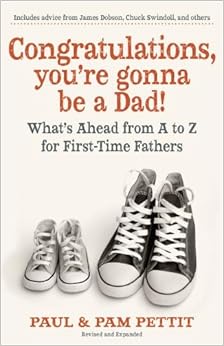
Congratulations, You're Gonna Be a Dad!: What's Ahead from A to Z for First-Time Fathers: Paul
[IMAGE1]
Pregnancy, also known as gestation, is the time during which one or more offspring develops inside a woman. A multiple pregnancy involves more than one offspring, such as with twins.[13] Pregnancy usually occurs by sexual intercourse, but can occur through assisted reproductive technology procedures. A pregnancy may end in a live birth, a spontaneous miscarriage, an induced abortion, or a stillbirth. Childbirth typically occurs around 40 weeks from the start of the last menstrual period (LMP).
10 Best New Dad Websites + 10 Best Books For Expectant Fathers

This is just over nine months – (gestational age) where each month averages 31 days. When using fertilization age it is about 38 weeks. An embryo is the developing offspring during the first eight weeks following fertilization, (ten weeks gestational age) after which, the term fetus is used until birth. Signs and symptoms of early pregnancy may include missed periods, tender breasts, morning sickness (nausea and vomiting), hunger, and frequent urination. Pregnancy may be confirmed with a pregnancy test
The Best Pregnancy Books for First Time Moms Mother Rising
Pregnancy is divided into three trimesters, each lasting for approximately 3 months. The first trimester includes conception, which is when the sperm fertilizes the egg. The fertilized egg then travels down the fallopian tube and attaches to the inside of the uterus, where it begins to form the embryo and placenta.
Pin on here comes baby

During the first trimester, the possibility of miscarriage (natural death of embryo or fetus) is at its highest. Around the middle of the second trimester, movement of the fetus may be felt. At 28 weeks, more than 90% of babies can survive outside of the uterus if provided with high-quality medical care.
The Expectant Father : Facts, Tips, and Advice for Dads-to-be - Armin A. Brott Expectant

Prenatal care improves pregnancy outcomes. Prenatal care may include taking extra folic acid, avoiding drugs, tobacco smoking, and alcohol, taking regular exercise, having blood tests, and regular physical examinations. Complications of pregnancy may include disorders of high blood pressure, gestational diabetes, iron-deficiency anemia, and severe nausea and vomiting. In the ideal childbirth labor begins on its own when a woman is "at term". Babies born before 37 weeks are "preterm" and at higher risk of health problems such as cerebral palsy.
1000+ images about Books for Expectant Fathers on Pinterest New dads, Survival guide and Father

Babies born between weeks 37 and 39 are considered "early term" while those born between weeks 39 and 41 are considered "full term". Babies born between weeks 41 and 42 weeks are considered "late term" while after 42-week they are considered "post term". Delivery before 39 weeks by labor induction or caesarean section is not recommended unless required for other medical reasons.
First Time Dad: A honest and real account of being a new parent by Markus Keinhorst
About 213 million pregnancies occurred in 2012, of which, 190 million (89%) were in the developing world and 23 million (11%) were in the developed world. The number of pregnancies in women aged between 15 and 44 is 133 per 1,000 women. About 10% to 15% of recognized pregnancies end in miscarriage.
The Pregnancy Book: Spiritual & Emotional Survival for First-time Parents van der Hart, Will

In 2016, complications of pregnancy resulted in 230,600 maternal deaths, down from 377,000 deaths in 1990. Common causes include bleeding, infections, hypertensive diseases of pregnancy, obstructed labor, miscarriage, abortion, or ectopic pregnancy. Globally, 44% of pregnancies are unplanned.Over half (56%) of unplanned pregnancies are aborted. Among unintended pregnancies in the United States, 60% of the women used birth control to some extent during the month pregnancy occurred.


0 Comments